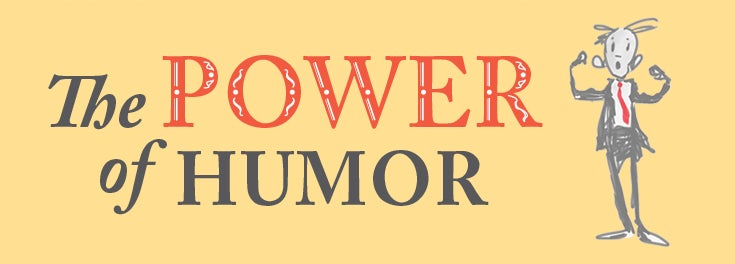
There’s nothing like a deep belly laugh to right the world’s wrongs. A robust ha-ha makes us feel really good, even if it lasts just a few seconds. Yet there hasn’t been much scholarly discussion about why we laugh and how laughter enhances our health and happiness. The University of Rhode Island is about to change that.
This fall the University kicks off its 52nd annual Honors Colloquium, a lecture series that brings academics, writers, scientists and artists to campus to talk about topics of interest to the University—and the community. This year’s subject: humor.
“The Power of Humor’’ will run Tuesdays at 7 p.m. from Sept. 22 through Dec. 8 in Edwards Hall on the Kingston campus. All talks are free and open to the public, and many events are live streamed for those who can’t attend.
The goal of the Colloquium lectures is to get people talking about compelling issues—and what could be more relevant than a discussion about the importance of laughing to lessen the anxiety in these turbulent times? Hunger, health care and global warming have been among recent Colloquium topics.
What could be more relevant than a discussion about the importance of laughing to lessen the anxiety in these turbulent times?
Humor is off-the-beaten path, and that’s fine with the two URI professors who came up with the idea: Rachel DiCioccio, professor of communication studies, and Brian Quilliam, associate dean and professor of pharmacy.
“Brian and I love humor,’’ says DiCioccio. “We can’t wait to show others how fulfilling humor can be—and how it can change people in a positive way.’’
Don’t expect a bunch of one-liners on Tuesday nights, though. One of the great things about this year’s program is that it features speakers from different disciplines. Dr. Patch Adams will talk about his groundbreaking work linking laughter to good health, New Yorker cartoonist Robert Mankoff will wow the audience with his funny drawings and British neuroscientist Sophie Scott will explain the difference between real and fake laughter. Other speakers will talk about humor as it relates to science, gender, the law, diversity, disabilities and politics—no doubt with references to this year’s unpredictable presidential campaign.
The benefits of humor are immense. Laughter boosts immunity, relieves stress, decreases pain, sharpens critical thinking skills, defuses conflicts, attracts others to us and promotes bonding, especially among co-workers. Best of all, it’s free.
Humor has helped DiCioccio get through the ups and downs of life. One funny story: It was a bitterly cold winter day at Michigan State University, where she was teaching. She looked chic in her high-heeled boots, flowing corduroy skirt and handsome leather briefcase. Her students watched as she approached from the parking lot. “I hit a patch of black ice in my granny boots,’’ she says. “I went down, and my Ralph Lauren skirt went up—over my head.’’
What’s worse, she was wearing knee-high socks, not tights. Mortified, she limped into the classroom. The students were “dead silent.’’ Funny thoughts danced in her head, and she performed a curtsy fit for royalty. The students clapped—loudly. “That’s how we got past it.’’
